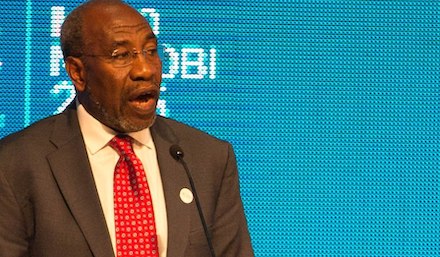Prime Minister Rugunda. Wikimedia Commons.
Uganda’s Prime Minister Dr. Ruhakana Rugunda has urged Ugandans to embrace a healthy lifestyle to forestall non-communicable diseases which, he said, are on the rise. “Let us do routine tests in order to prevent severe conditions. We are increasing local capacity to do things on our own and collaboration is crucial between government and the private sector,” Dr. Rugunda declared.
His message was well received. Civility is a rare commodity in our politics. Most of us disagree by being disagreeable, and hence consign civility to a velvet coffin. Thomas Ruhakana Rugunda is quite the opposite. Most of his enemies would agree that he is the last gentleman of Ugandan politics. Where most politicians use language that lands them in court, Rugunda remains courtly.
His dignity counterbalances the indignity of having to operate in a political culture where utterances such as “Kumanyoko”—a vulgar reference to your mother’s private part—pass for wit. The English say a gentleman is one who never insults another by accident, but Rugunda goes one better: he never insults anyone. Indeed, his politeness, punctuated by glad-handing, makes his critics wonder if he is trying to paper over the empty spaces within: a shallowness which embodies self-compromise as compromise. His critics say this is why he was able to work with two mortal rivals, President Milton Obote and President Yoweri Museveni.
His supporters say he was smiled on by the gods, and that’s why politicians on both sides of the political divide could be united by the need to enlist his energies. “Rugunda,” could easily be a byword for inoffensive, which makes him the most politically correct politician in the country.
As a Scorpio, he is typical of the sign belonging Pluto, “The powerful physique, the features noticeably heavy or sharp, and clearly drawn. Along with a poised surface carefully designed to hide a boiling inner nature.”
So those who see Rugunda as having the impulses of cardboard may want to look again at his record: he was known as a charismatic firebrand at Busoga College, Mwiri, Makerere University and Howard University in the United States of America.
A policy czar and chieftain of political maneuver, he can be rational as well as play to the gallery. So he can understand the big questions, while tackling the dastardly issues surrounding how to clobber dynamic presidential challenger Bobi Wine and his long-marching supporters. The sound and tone of statesmanship informs Rugunda’s every word and inflection, so he is a politician best suited to healing a country wounded by its many divisions. In 2005, the late former president Obote was buried at a private function at his ancestral home in Akokoro, Apac. Obote’s widow Miria thanked former UPC youth wingers Tumusiime Mutebile, now Central Bank Governor, and Ruhakana Rugunda who attended the burial ceremonies, saying that they had acted professionally. Eulogistically, she then added that Obote died happy having groomed young people like Mutebile and Rugunda. This was indeed high praise.
That said, Rugunda’s continued service to the National Resistance Movement (NRM) regime under President Museveni is a disservice to Obote’s mentorship, his own virtue and the country’s progress. By conniving at maintaining the NRM’s death-grip on the country, Rugunda reminds us of words attributed to Edmund Burke: “The only thing necessary for the triumph of evil is for good men to do nothing.”
That Rugunda is a good man is not in doubt. That he helps consolidate a bad regime leaves his political record in doubt, however. Rugunda, whose Christian name is Thomas, reminds us of history’s other Thomas: Sir Thomas More, who was a person defined by his conscience and who served a tyrant, Henry VIII. More, a 16th-century Chancellor of England, was effectively a prime minister like Rugunda.
However, on principle, he refused to endorse Henry VIII’s wish to divorce his wife Catherine of Aragon and he was subsequently beheaded. Why did Henry VII require More’s endorsement? In the play, A Man For All Seasons, we get an idea why.
Thomas More: Why does Your Grace need my poor support?
Henry VII: Because you’re honest. And what is more to the purpose, you’re known to be honest.
According to Wikipedia, “Since 2007, the English Wikipedia page of Ruhakana Rugunda has received more than 141,665 page views. He is the 9th most popular Ugandan Politician.” This is because Rugunda is honest, and known to be honest.
So President Museveni is cashing on Rugunda’s sterling reputation in order to shore up his and the NRM’s dwindling political capital. This means Rugunda, like Sir More, can make a contribution to history not by attacking the NRM but by refusing to endorse it any longer.
If Rugunda can rise to this occasion, he will send a powerful message to Ugandans that change is essential and change must come now. Certainly, he will be punished by President Museveni. However such punishment will preface the finish of a regime that’s long passed its sell by date.
It’s time for Rugunda to reclaim his greatness, the greatness Obote saw in him, and thereby take a stand. He must stand by the people not only by battling Covid-19, but in battling a far worse disease: dictatorship.
If he can do so, Ugandans will follow him the way they followed Dr. Besigye. He shouldn’t wait to be pushed, otherwise he will become as inconsequential as former prime minister Amama Mbabazi.
We live in times which stand on the cusp of change; Rugunda should embody the change we seek to see in our politics.
Merry Christmas.
The columnist can be reached via mugashop74@gmail.com







